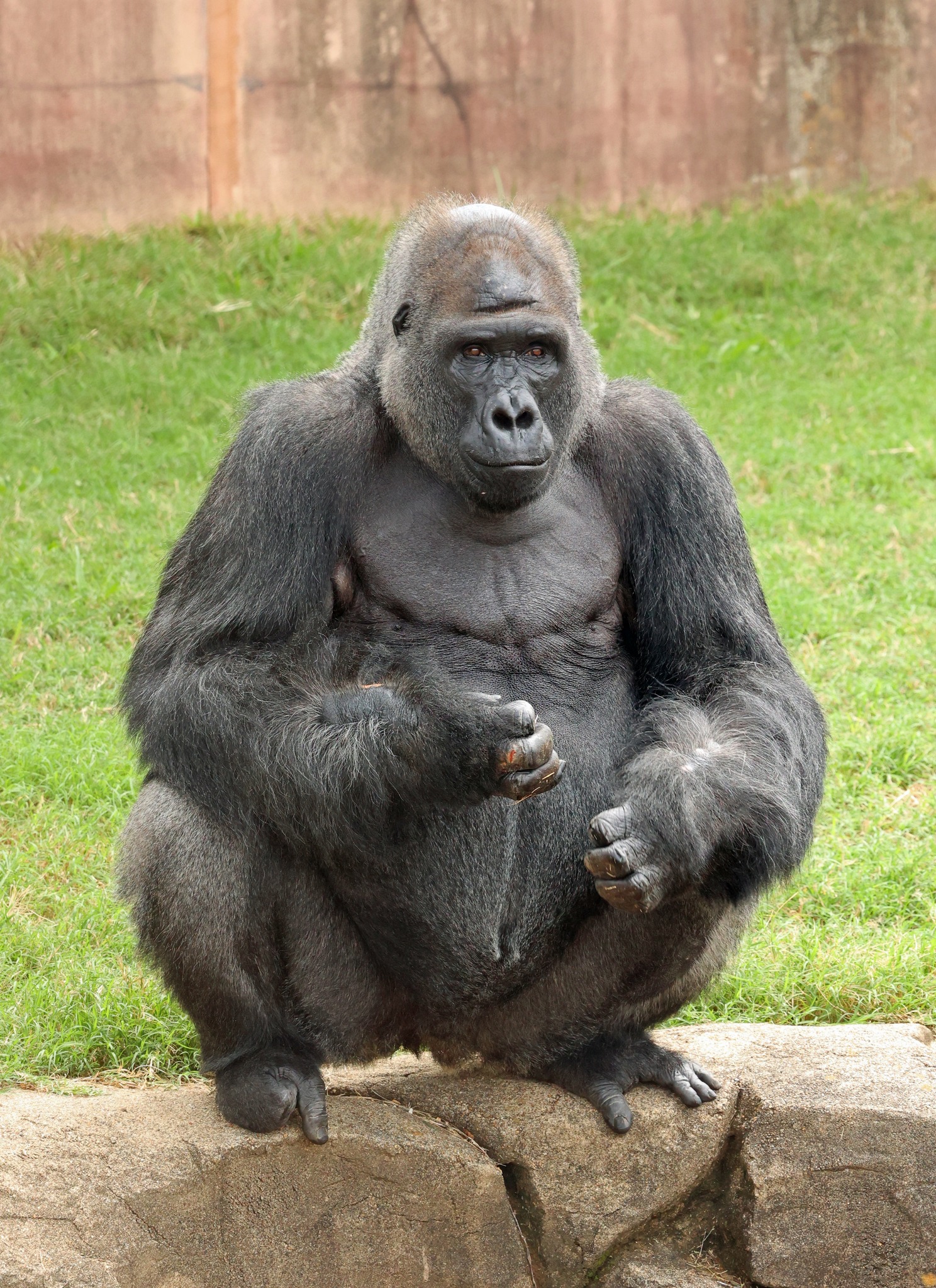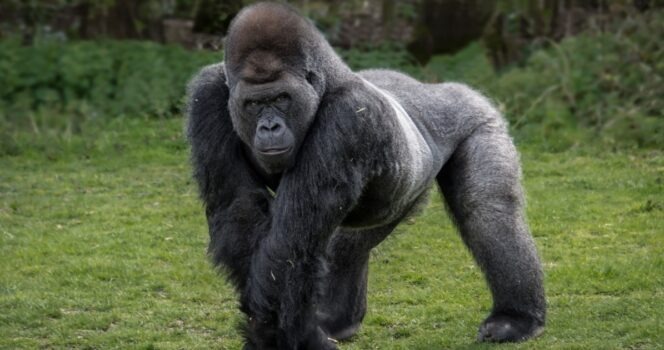At Port Lympne Wild Animal Park in Kent, England, visitors are treated to an extraordinary sight: Ambam, a silverback gorilla, striding upright on two legs like a human. Standing six feet tall and weighing approximately 34 stone, Ambam’s unique behavior has made him an internet sensation and a highlight for zoo-goers.
What makes Ambam’s upright walking remarkable is not just his size or strength—it’s that he reportedly taught himself this skill. Observers note that Ambam began mimicking the movements of his zookeepers and gradually developed the ability to balance and walk with a human-like stride. This rare behavior provides a window into the adaptability, intelligence, and curiosity of gorillas, highlighting the nuanced capabilities of these great apes.

A Rare Glimpse into Gorilla Intelligence
Walking upright is not typical behavior for gorillas, who usually move using knuckle-walking to support their weight. Ambam’s ability to walk on two legs challenges common perceptions about gorilla mobility and cognition. By observing and imitating human movement, Ambam demonstrates problem-solving skills and a capacity for learning that parallels aspects of human behavior.
Scientists suggest that such behaviors can emerge from a combination of environmental stimulation, social observation, and innate curiosity. Ambam’s self-taught walking ability exemplifies how intelligent animals can adapt and explore new behaviors when given opportunities to observe and experiment in a safe setting.
The Role of Zoo Environments in Behavioral Enrichment
Port Lympne Wild Animal Park plays a crucial role in supporting the welfare and enrichment of its residents. Environments that provide visual stimulation, safe exploration opportunities, and interaction with caretakers can encourage unusual yet harmless behaviors like Ambam’s upright walking.
Behavioral enrichment is an essential part of modern zoological practice. It allows animals to engage with their surroundings in ways that reduce stress, encourage natural instincts, and even foster problem-solving skills. Ambam’s behavior is a vivid example of how enrichment programs can spark curiosity and demonstrate cognitive flexibility in great apes.

Ambam as a Conservation Ambassador
Beyond his viral fame, Ambam serves as an ambassador for gorilla conservation. The Port Lympne Wild Animal Park is part of global efforts to protect endangered species and raise awareness about threats such as habitat loss, deforestation, and poaching.
Ambam’s human-like gait draws attention not only to his intelligence but also to the vulnerability of gorilla populations in the wild. By showcasing his individuality and capabilities, he helps bridge the gap between humans and animals, inspiring visitors to care about wildlife preservation and the protection of natural habitats.
The Intersection of Curiosity and Cultural Fascination
Humans have long been fascinated by behaviors in animals that resemble our own. From storytelling to myth, upright or human-like movement in animals has often been interpreted as a sign of intelligence or connection. Ambam’s walking ability evokes this fascination in real life, sparking joy, wonder, and discussion worldwide.
While it’s tempting to anthropomorphize such behaviors, it’s important to recognize the scientific value of observing natural and learned behaviors in context. Ambam’s actions illustrate the balance between natural instincts and environmental influence, offering insights into how animals perceive and interact with the world.
Reflections on Human Curiosity
Ambam’s story reminds us that curiosity is a shared trait across species. Just as humans explore, experiment, and learn from observation, animals like Ambam display similar tendencies in safe, enriched environments. Observing such behaviors fosters a deeper appreciation for the intelligence, individuality, and adaptability of wildlife.
Moments like these encourage reflection on our responsibility toward conservation and the ways humans can coexist with nature. Ambam’s upright walk is not just a viral spectacle—it’s a reminder of the profound connections we share with other species and the importance of preserving their habitats.

Conclusion
Ambam the silverback gorilla exemplifies the extraordinary potential for learning, curiosity, and adaptation among great apes. His upright walk has captivated audiences globally, demonstrating both intelligence and individuality while serving as a conservation ambassador. Through careful observation, enrichment, and protection, zoos like Port Lympne provide spaces where animals can thrive and display behaviors that inspire wonder and respect. Ambam’s story reminds us of the power of curiosity, observation, and the enduring bond between humans and wildlife.
Sources
Newsner. “People Everywhere Are Absolutely Loving This Gorilla. Just Wait Till He Turns Around And You Will Know Why.” en.newsner.com
Port Lympne Wild Animal Park. “Gorilla Conservation and Care.” plwapark.co.uk
Smithsonian National Zoo. “Great Ape Intelligence and Behavior.” nationalzoo.si.edu
BBC Earth. “Observing Intelligence in Gorillas.” bbc.com/earth
